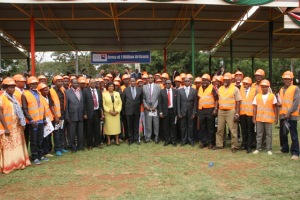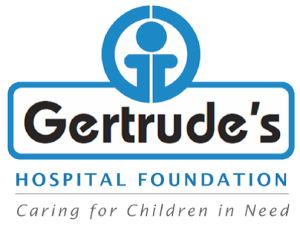Over 500 male and female artisans have graduated from a free skills training program offered at the Alibhai Shariff Centre of Excellence in Nairobi.
The graduates underwent globally competitive competency courses in: woodwork, metal fabrication, painting and electrical works. The training was provided by a group of local instructors,who attended the Global Tool Trainer Certification (GTTC) at the Stanley Black and Decker University in Dubai.
The program, a public-private partnership between Housing Finance Foundation, Alibhai Shariff.and the Ministry of Science, Education and Technology, is geared at addressing the gap in vocational skills in the informal sector, particularly in the construction industry.
Speaking during the ceremony Mr. Frank Ireri, Housing Finance Managing Director said, “We are delighted with the way this program has proceeded and fulfilled its core mission of enhancing students’ technical capacities. Considering that this was the pilot phase, the training has surpassed all expectations”.
Housing Finance Foundation is currently running a Vision 2030 flagship project that aims to create‘An Army of 1 Million Artisans’. Alibhai Shariff, on the back of decades of legacy in Kenya, further cemented its vision of providing responsive goods and services that will serve a growing and dynamic industry through this initiative. It provides a best practice example of partnership frameworks between both formal and informal private sector players, for the greater good.
“Vision 2030 cannot be implemented without these artisans. As Housing Finance, we cannot do this alone which is why we are partnering with the government through the Ministry of Education, Science and Technology, as well as with market leaders like Alibhai Shariff,” said Mr. Ireri.“Our dream to have one million skilled artisans is well on course, and these graduates are a testimony to that,” he added.
The 558 graduates are well equipped to provide competitive services to the construction industry..The trainingfacilitated the transfer of knowledge and skills that are relevant to current market needs.
“As partners, we are playing a bigger role than providing entrepreneurs with the skills and confidence they require to serve a growing need; we are playing the role of active cultural architects, who have envisioned the potential of the sector, and are breaking this down into singular, achievable goals, which will ensure a greater number of people become stakeholders to this dream and enjoy it’s rewards,” explained Mr. Rafiq Shariff, Executive Director of Alibhai Shariff & Sons Ltd.
Mr. Shariff explained that the graduates represented both men and women from Nairobi and its environs, and that deliberate effort was put to promote equity in the program. “As we grow our network in the country and beyond, we will carry this vision with us, and help create a positive operating environment for both suppliers such as ourselves, and job creators.”
One major challenge facing the Government and the labour market is the absence of a skills inventory that would indicate the distribution of well-trained Kenyans. The training at the TVET level has been hindered by demand that is outpacing available facilities; many young people who end up in the informal or Jua Kalisector do not have formal training to make them more competitive.
“This skills-enhancement initiative was launched in conjunction with Alibhai Shariff’s Partners – Stanley Black and Decker and Sadolin Paints (E.A.) Ltd at the Alibhai Shariff Building Centre – Thika Road Mall.Training has been ongoing since Mid 2014, with the next round scheduled to commence later this month.
“The backing we have received from Alibhai Shariff and the Government is a testament to the important work we are carrying out to help artisans fulfill their potential and contribute to the growth of Kenya’s economy.” concluded Mr. Ireri.
About Housing Finance Foundation
Housing Finance Foundation (HFF) is a subsidiary of Housing Finance, whose objectives are to create a strong social investment arm to complement its economic value. HFF key focus is on Technical and Vocational Entrepreneurial Training. Housing Finance Foundation main agenda is to create an Army of 1 Million Artisans to supply skilled labour to the region and beyond.
About Alibhai Shariff
Alibhai Shariff has built its reputation as a leading building materials providerin the country, stocking quality products and accessories from top international brands. This holistic offering is specially designed to assist specially professionals, developers, facility managers and fundi’s and even DIY enthusiasts with all their construction requirements. At Alibhai Shariff, we strive to “create beautiful, quality spaces for work and living” and constantly grow our business towards this end.









 out of 40 million Kenyans, 12,000 are born with heart disease. Over 6,000 of these are in need of open heart surgery. The Gertrude’s Hospital Foundation saw the need to intervene for the less privileged because there is a great deficiency of medical services in this sector, considering that less than 300 surgeries are conducted in Kenya annually with the help of their families, well-wishers and established heart surgery programs. Many children either die or have poor quality of life. Dr. Mark Awori led his dedicated team in conducting a successful surgery. He says that the main drive for starting another program is the high numbers of children with deficiencies as the statistics tell us. The highest programs are also done at children’s hospitals and therefore the desire is to deliver the highest quality of care in the country. The team follows the guidelines of the word ‘TOUCHES’.
out of 40 million Kenyans, 12,000 are born with heart disease. Over 6,000 of these are in need of open heart surgery. The Gertrude’s Hospital Foundation saw the need to intervene for the less privileged because there is a great deficiency of medical services in this sector, considering that less than 300 surgeries are conducted in Kenya annually with the help of their families, well-wishers and established heart surgery programs. Many children either die or have poor quality of life. Dr. Mark Awori led his dedicated team in conducting a successful surgery. He says that the main drive for starting another program is the high numbers of children with deficiencies as the statistics tell us. The highest programs are also done at children’s hospitals and therefore the desire is to deliver the highest quality of care in the country. The team follows the guidelines of the word ‘TOUCHES’.